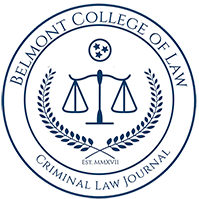State of Tennessee v. Terrell Lamont Reid, No. W2019-00636-SC-R11-CD (November 5, 2020).
Written By: Emily Seaborn, Associate Editor
This case concerns claims of relief under Tennessee Rule of Criminal Procedure 36.1, and whether claims are void, or voidable when a person is sentenced under a statute that is presumptively constitutional at the time but is later declared unconstitutional.
The crux of this case lies in its procedural history, not its factual background. On June 24, 2015, Terrell Lamont Reid pleaded guilty to possession of cocaine with intent to sell and possession of a firearm by a firearm by a convicted felon. The latter of the charges was enhanced from a Class C felony to a Class B felony pursuant to the criminal gang enhancement statutes. The trial court sentenced Reid to concurrent seventeen-year sentences for both convictions.
On April 7, 2016 – after Reid was sentenced – the Court of Criminal Appeals declared the criminal gang enhancement statute unconstitutional as a violation of substantive due process. However, the enhancement was presumptively constitutional throughout Reid’s sentencing. Despite the finding that the enhancement was unconstitutional, Reid failed to file a petition for post-conviction relief within the one-year period.
Then, on January 14, 2019, Reid filed a pro se “Motion to Correct [an] Illegal Sentence Pursuant to Tennessee Rule[] of Criminal Procedure 36.1.” In short, Reid’s argument was that his sentence was illegal because the criminal gang enhancement was deemed unconstitutional, and that the appellate court’s decision declaring the enhancement unconstitutional should be applied retroactively to his case. On the other hand, the State argued that Reid was not entitled to relief because his case was “final and not pending or under review” when the appellate court’s decision was decreed.
The trial court denied Reid’s motion, but after he appealed, the Court of Criminal Appeals reversed the judgment of the trial court. The court held that the “application of an unconstitutional law renders a sentence void, and therefore, illegal.” Finding Reid’s sentence void and illegal, the Court of Criminal Appeals remanded the case to the trial court “to determine whether the illegal aspect was a material component of the plea agreement.” The Tennessee Supreme Court then granted the State’s application for permission to appeal.
The Tennessee Supreme Court was reviewing whether Reid made a colorable claim for relief under Tennessee Rule of Criminal Procedure 36.1, which governs sentences that are void, or illegal. Much of this case turns on the Court’s interpretation of its prior decision in Taylor v. State, 995 S.W.2d 78 (Tenn. 1999). In Taylor, the State argued, and the Court concurred, that this Court held that a sentence is not rendered void merely because the statute under which the sentence was imposed is later declared unconstitutional. This holding distinguishes a void sentence from a voidable sentence. A voidable sentence may only be corrected if challenged in a timely post-conviction petition, whereas if a sentence is void and illegal, the sentence may be entitled to relief under Rule 36.1. Rule 36.1 motions can be filed at any time.
The dispositive issue, in this case, was whether Reid’s sentence was void or voidable. If Reid’s sentence was voidable, then it could only be corrected by a one-year post-conviction motion, but if it was void – like he asserts – then it could be entitled to relief under Rule 36.1. Ultimately, the Tennessee Supreme Court concludes that Reid’s sentence is voidable, and not void and illegal. The Court reaffirms its holding in Taylor – “that a statute is presumed constitutional and that a sentence imposed in accordance with a statute in effect at the time of its imposition is voidable and not void.” The Court also differentiates its interpretation of Taylor from that of the intermediate appellate court. While the intermediate appellate court cites to Taylor, and suggested that its holding “is limited to cases preceding the adoption of Rule 36.1 and to cases where declaring a statute unconstitutional had the effect of reviving an earlier statute,” the Tennessee Supreme Court found that it did not limit its holding in that way.
This case clarifies its past ruling in Taylor and reaffirms that a sentence is not per se void and illegal if the statute is presumptively constitutional, but was later declared unconstitutional. Notably, this ruling and interpretation narrows a petitioner’s ability to appeal. If the Petitioner was sentenced under a statute that was later declared unconstitutional, they must challenge the sentence with a timely petition. In contrast, if this Court held that the sentence was void, the sentence could be corrected at any time. Petitioners are now restrained to a time period to appeal their sentence if the statute is declared unconstitutional, which can create greater barriers for Petitioners to correctly, and timely, file their appeals.
